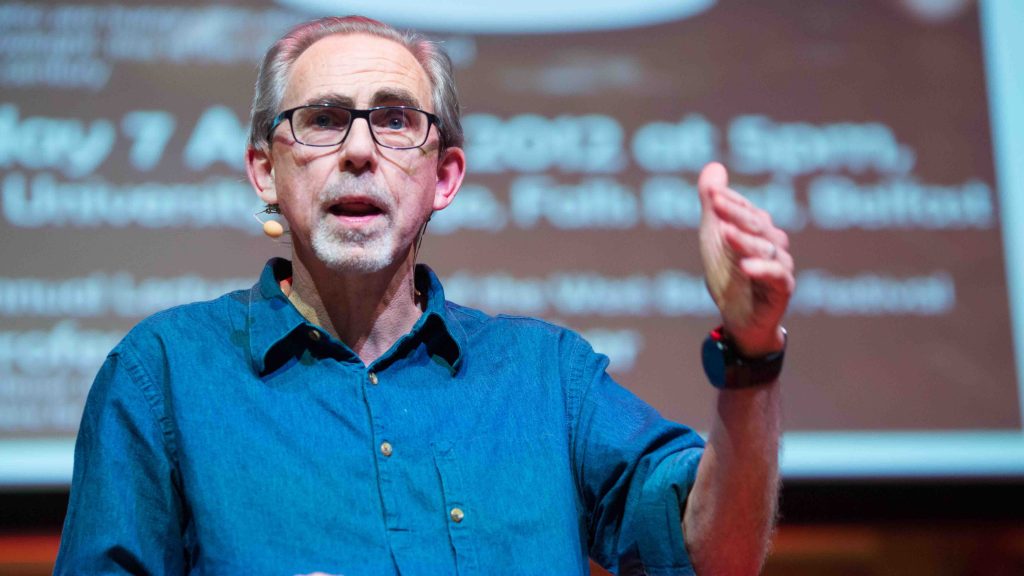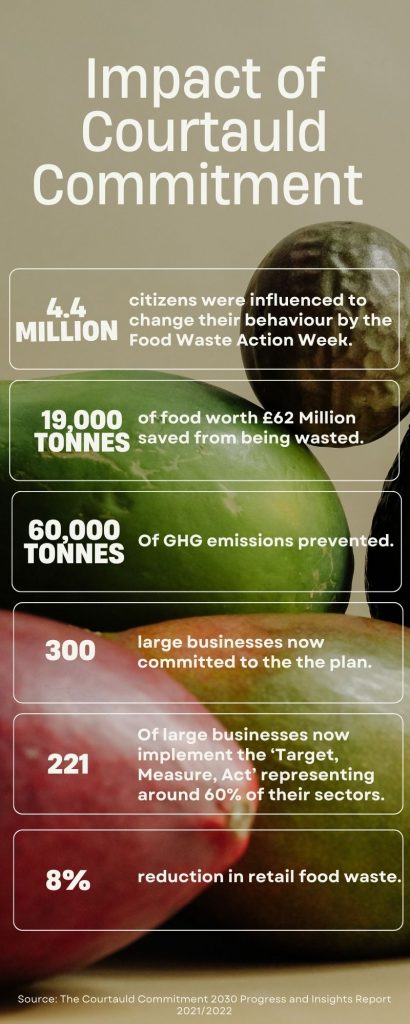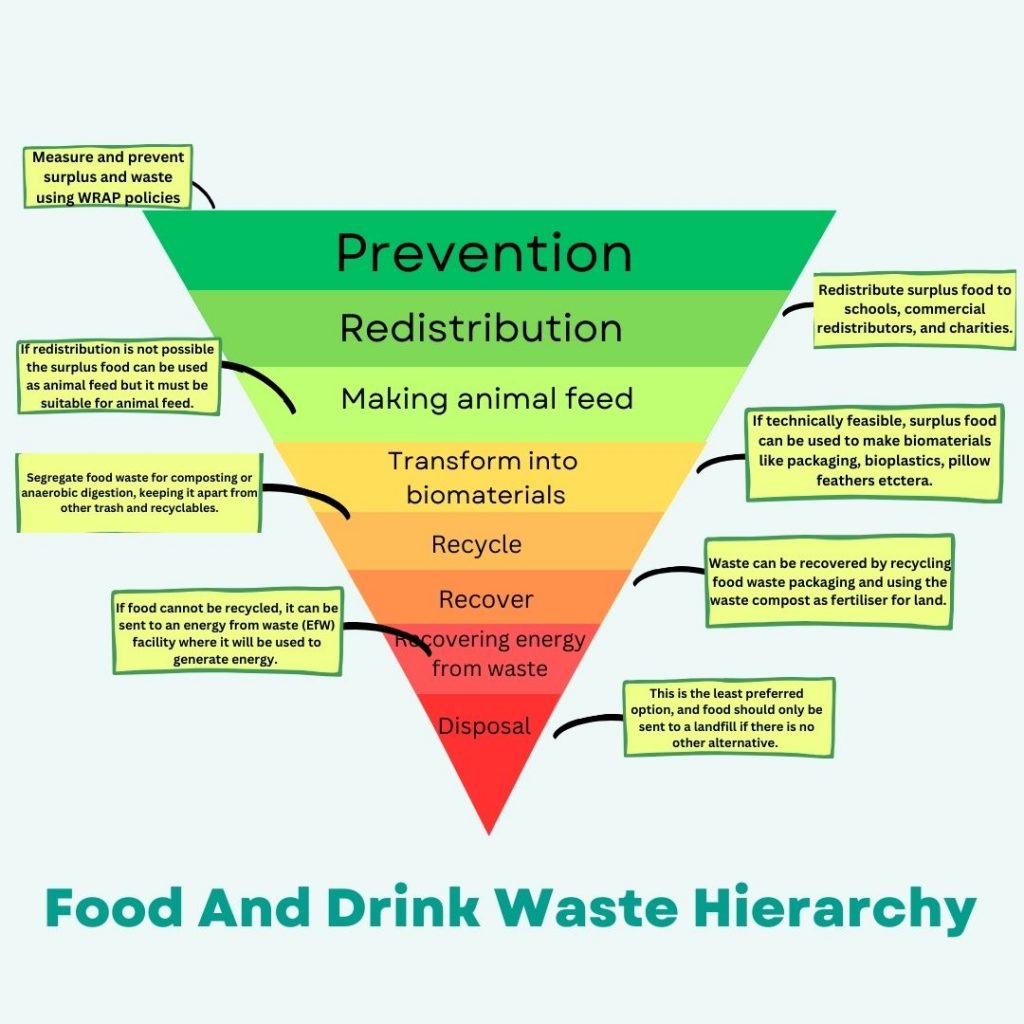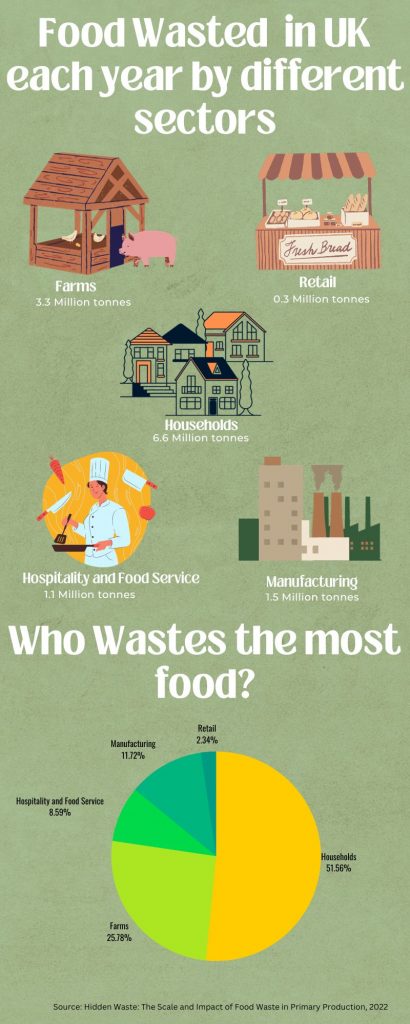Over eleven million people faced food insecurity last year, while food enough for billions of meals is wasted each year. Is it a lack of government policies, corporate greed, or mere complacency on the consumer’s part that causes the UK’s food to go to waste?

It’s the weekend — the day you have set out for your chores. The day when you grudgingly take your trash out. The strong stench coming particularly from the brown bin designated for food waste is not something you want to start your day with, so you try to tie it up and take it out of your house as soon as humanly possible so that you don’t have to think about it for at least a week. However, oblivious to you — your waste along with the food wasted across households in the UK, amounts to a staggering nine and half million tonnes of food in landfills each year!
It is not just you, manufacturers, restaurants, supermarkets, and farms across the country join in to take the total amount of food wasted to almost 13 million tonnes annually. However, households still contribute to more than half the amount of food wasted each year suggesting a greater responsibility of households but are they really behind all this waste? Food activists say probably not. Academic and food policy activist Dr Martin Caraher believes that most of this waste is due to a lack of government intervention.
“We all have a duty and should be looking at it but it’s the absence of government policies that causes this. The government just has not done anything,” said Dr Martin Caraher, an academic and food policy activist. “I’m not a fan of the supermarkets, but they have been at least trying to do something. The problem is that there is no standard and the government needs to set a standard.”

The UK government aims to halve its food waste by the year 2030, according to its 2022 Food Strategy, in line with the United Nation’s Sustainable Developmental Goals (SDGs). To achieve this, the government is looking at ways to improve food waste reporting for large food businesses and help consumers waste less food via the Waste and Resources Action Programme (WRAP). Dr Christian Reynolds, a reader in food policy at City, University of London, believes both of these measures will have little effect.
“It’s a pity that the government has not continued to legislate for measurement of food loss and waste at the business level so that means we’re getting the aggregate, but we’re not getting the details. What gets measured gets managed and right now we’re not even measuring, ” says Dr Reynolds, a leading expert in food waste reduction globally.
The current system working under the Courtauld Commitment enables collaborative action across the entire UK food chain to deliver farm-to-fork reductions in greenhouse gas emissions, food waste and water stress. This system works on voluntary reporting of food waste by businesses across the food supply chain which is not very effective according to campaigners.
Dr Reynolds says, “The Courtauld Commitment is a voluntary agreement with the majority of the supermarket sector as well as other groups to, as a group, reduce food waste but there’s no transparent reporting on weights etcetera. So each organisation doesn’t have to report their weight.”
He explained that the government’s reliance on voluntary commitments is because it wants to avoid appearing as a ‘nanny state’. According to him, though it seems these partnerships are effective at keeping economic growth happening, they are a slower instrument of waste reduction.

The Food Strategy 2022 aims to help households waste less food via behaviour change programmes run by the government-sponsored charity WRAP. It currently runs behaviour change programmes like “Love Food Hate Waste’ to facilitate behaviour change in households and “educate, and inspire citizens to keep food out of the bin and on their plates.” However, Dr Reynolds believes these programmes might be looking in the wrong direction.
“If you think about intervention or behaviour change campaigns, my research has shown they can be effective up to a point. Because of population growth along with a myriad of other factors, education campaigns or information campaigns are not enough to reduce food loss and waste,” he says. “You need to think about system-wide upstream, downstream, and other policies, rather than blaming the individual and the household for food waste.”

He argues these approaches include wider food system interventions like changing packaging, or variety of the product sold so that it has a longer shelf life and a greater focus on legislation that targets food waste along the food supply chain, not the individual.
The Environment Act 2021 made it necessary for local authorities to arrange separate weekly food collections for recycling and composting from households. A capital funding of £295 million was given to local authorities to do so effectively. However, campaigners like Dr Caraher worry that these existing government policies on managing consumer food waste can encourage more wasteful behaviour.
He says, “What we have seen is local government and council introducing food waste collections. Now that’s good, but it gives the impression that it’s okay to create food waste as I now don’t have to worry about it because I recycle.
“I’m not saying do away with those systems. Other countries have moved to charge people for their waste. Bins are weighed, you pay a percentage for it, and if you manage to cut down, you get something back off your annual bill.”
Such a system has been successfully implemented in the Asian nation of South Korea, where residents have to pay a certain amount for food waste they produce. This not only resulted in a reduction in food waste but the country now recycles almost all of its food waste. Campaigners believe that the UK can follow suit but it lacks political will.

This is only a statutory guidance for any business or organisation which produces, handles, treats, or disposes of surplus or waste food and drink by the Department for Environment Food & Rural Affairs.
Dr Caraher says, “They [the UK Government] put off banning BOGOFS (buy-one-get-one-free offers) for another year on the basis that people are financially insecure but we know a lot of the research about these. They encourage waste and they’re good for the supermarkets, but they’re not necessarily good for consumers because often the BOGOFs are around unhealthy products anyway, they’re not around healthy products.”
In 2014, retailers were urged by a House of Lords Committee to stop ‘buy-one-get-one-free’ schemes, as it was alleged they encouraged shoppers to waste more. These offers were set to be banned in October this year, but the ban has now been delayed to 2025 due to ‘continuing pressure from the global rise in food prices’. Following talks at Downing Street between the Prime Minister and the food retail and manufacturing lobby, the Extended Producer Responsibility (EPR) Scheme which would have made food businesses pay a part of the recycling costs of food packaging was also delayed by a year.
Dr Caraher believes this laxity in legislation has left large food businesses particularly retailers to regulate themselves which leads to food waste prevention taking a back seat.
He says, “We live in a market economy and the supermarkets must make a profit. I mean they use recycling waste and all of that thing as a corporate social responsibility. They sell that to us as conscientious consumers but they’re donating to the food banks because they then do not have to pay for landfill.”
Retailers produce the least amount of food waste across the supply chain at 0.3 million tonnes, but experts believe that their policies can end up having a ‘domino’ effect, that generates more waste down the chain.
“That’s not accounting for the stuff that’s left in the fields. Don’t forget the farmer who grows two tonnes of potatoes and half of them are the wrong shape. Very often that’s left in the fields, and that’s not even part of that 300,000 tonnes of waste,” says Dr Caraher.

However, it might not be entirely fair to see supermarkets as the culprit, as they respond to various pressures along the supply chain, according to Dr Reynolds.
“I guess it’s because supermarkets are the bottleneck in the food system and have a lot of power, but may not have all the power,” he says. “Supermarkets are a visible part of the system. And yes, there are unfair trading practices.”
The priorities regarding waste have also shifted over the years, he explained. In the 1940s-1950s, the main priority was making food available, in the 1970s and 1980s it was making food available with maximum choices and now, the priorities have shifted towards the food system perspective of animal welfare, labour rights etcetera.
“So the supermarkets are balancing lots of different issues. The wider food system is balancing lots of different issues and food waste is one of these issues and until the 1990s, early 2000s, it wasn’t the top priority,” he says. “There are multiple other things, and there is a lack of government policy in this space, as they’ve relied on other mechanisms because food waste until the last 5-10 years hasn’t been measured as well as it could be and evidence-based intervention is not there. It’s only in the last five years or so that we’ve got to grips with knowing what we can do and see.”
Consumers generate over half of the food waste across the supply chain amounting to 6.6 million tonnes of food wasted each year.
Dr. Caraher says, “I think we just don’t appreciate food. I think it goes back to this cultural issue. We’ve had so much food and people don’t see a problem with waste. The people in the UK are three, maybe four generations removed from the land. A lot of the recycling issues have reinforced that so people think ‘I’m still’ doing good for the environment actually but you’re not because you just bought stuff you don’t need in food terms.”
However, this is changing as people have become more aware. Almost 62% of UK citizens (excluding Scotland) are now worried about food waste in the country according to official figures. It is also the second most common food-related concern in the public, second only to food prices.
Dr Reynolds says, “The ubiquity and commonness of the amount of food and the cost of food is changing and that has driven this awareness of waste. So there is a change. There is a change in online sales and online shopping as well. There are lots of small changes that add up to saying that our purchases and food behaviours are changing, and that is leading to differences in food waste.”
Dr. Reynolds urges that the government’s goal to halve its food waste by 2030 can still be reached if acted timely with a combination of industry action, government action, public-private partnerships etc.
“I still have a lot of hope that we can crack SDG, 12.3, of halving food loss and waste within the UK by 20-30, but a lot of different things need to align for that to happen and we’re not on track for that right now, which is terrifying,” says Dr Reynolds.
